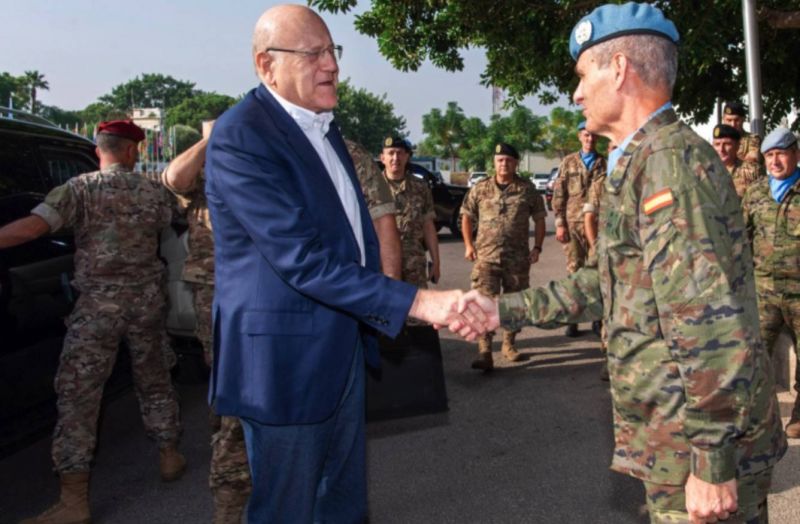
Caretaker Prime Minister Najib Mikati and UNIFIL chief Aroldo Lazaro Saenz shake hands in Naqoura. Oct. 24, 2023. (Credit: UNIFIL official website)
Hassan Nasrallah has set the tone. In his most recent speech on Friday, Hezbollah’s secretary general opened the door to a political settlement with Israel for long-term stability in southern Lebanon.
Barely three days later, caretaker Prime Minister Najib Mikati followed suit. In an interview with the Al-Hurra TV channel, Mikati expressed his support — and even that of Hezbollah — for the “choice of peace” and specified Beirut’s conditions for an agreement.
Despite this, in the early days following Operation al-Aqsa Flood, Mikati said the decision for war or peace was not in the hands of his cabinet.
Nonetheless, this important development comes ahead of US envoy Amos Hochstein’s anticipated visit to Beirut to defuse escalations between Lebanon and Israel.
At what cost?
The prime minister chose an American channel to talk about a “diplomatic solution” to the war, which has been underway since Oct. 8, because his message is mainly intended for Washington.
Keen to prevent an all-out conflagration in Lebanon, and to bring a rapid end to the war between Israel and Hamas, the Biden administration has stepped up its diplomatic efforts and put pressure on Tel Aviv.
US State Secretary Antony Blinken arrived to Israel on Monday evening as part of a regional tour that included Turkey and Saudi Arabia for “tough talks” on de-escalation.
With regard to southern Lebanon, the US plan put forward by Hochstein is based on demarcating the land border between Lebanon and Israel and settling the 13 disputed points along the border.
There is even talk of an Israeli withdrawal from the Shebaa Farms, which are disputed between Lebanon and Syria.
Syria lost Shebaa to Israeli occupation following the 1967 war. Mikati cited the return of this small piece of territory “to Lebanese sovereignty” as the key condition for an agreement.
In return, Mikati said that Hezbollah would be prepared to withdraw from the area stretching from the Litani River to the border, as per UN Security Council Resolution 1701.
Meanwhile, Netanyahu’s war cabinet seems confined to a much more belligerent logic and has multiplied its threats against Lebanon.
The prospect of imminent war and the series of assassinations of “resistance axis” leaders isn’t sitting very well. Hezbollah also seems aware that the Americans could pay a handsome political price in exchange for de-escalation.
The unprecedented rhetoric Nasrallah employed in his latest speech underscores this trend. Nasrallah, who had threatened to simply annihilate Israel and destroy Tel Aviv, claimed not to be “targeting civilians” on the other side of the border and was delighted that the two-state solution is back on the agenda. In his speech, he used the terms “negotiations,” “agreement” and “solution,” for the first time.
Role distribution
But how can Hezbollah negotiate without appearing to break its word after stating that negotiations would only come when the war in Gaza was over?
Hezbollah seems to have chosen to hide behind Lebanon’s official position, which is represented by Prime Minister Mikati. This allows the party a token of goodwill with the Americans and justifies that it is Israel’s fault if things escalate.
Known for being close to both Hezbollah and the West, Mikati plays his role well. He would certainly not have expressed such a sensitive position without a green light from Hezbollah and Amal, his main political supporters.
Sources close to both Mikati and Hezbollah refused to comment on the matter to L’Orient-Le Jour.
“In general, coordination with Mikati is constant on all issues,” said Kassem Kassir, an analyst close to Hezbollah.
On this issue in particular, Hezbollah is also working closely with the former Director of General Security, Abbas Ibrahim, and the Deputy Parliament Speaker, Elias Bou Saab. The latter met with Hochstein in Rome on Tuesday, ahead of his visit to Beirut on Thursday.
This is not the first time that Hezbollah has skillfully employed this division of roles. In October 2022, the demarcation of the maritime border between Israel and Lebanon was, in practice, a tacit agreement between the Americans and Hezbollah.
Even when Hezbollah was hiding behind the Lebanese state, Nasrallah repeated in all his speeches at the time that he was not involved in the negotiations “which only concern the authorities” whose decisions he so respects.
But once the agreement was sealed, Nasrallah presented it as a victory for his party, and as an almost selfless gift from Hezbollah to the Lebanese. Things seem to indicate that things will be the same this time.
In his speech, Nasrallah was keen to emphasize that if Lebanon is today “facing a historic opportunity to liberate its territory,” it is “thanks to supporting the resistance in Gaza.”
Back in November, Mikati had called for a “political plan” to avoid plunging Lebanon further into conflict.
“We will consider the right of Israel and the right of the Palestinians,” Mikati told The Economist at the time. “I am sure Hezbollah and Hamas will lay down their weapons.”
This article was originally published in French in L'Orient-Le Jour. Translation by Joelle El Khoury.